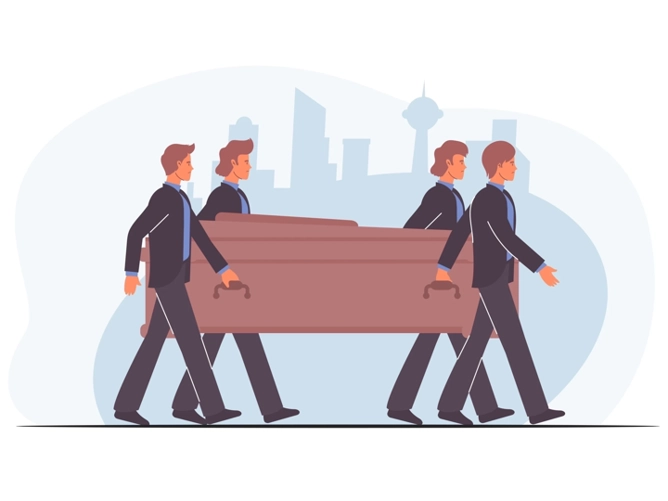
Funeral in Germany [Expats Guide 2026] - Live In Germany
In Germany, the price of death is expensive but just and organized. Germans accept the inevitability of life due to which, funeral in Germany and cemetery culture may differ from the rest of the world. With strict laws bounding the German funeral and Cemetery industry, the burial of the departed is somewhat obligatory, either cremated or not.
Moreover, the rigid German law of this costly death culture has declared Germany the country with the highest funeral costs in the world. With rituals like embalming, cremation, and burial destined for every German, let’s get into the depth of the German culture of Funerals.
Perception of Death in Germany
Germans are strict people with rigid laws. They solely dedicate their lives to strict laws that are critical to follow. The German tradition has always remained rigorous with an efficient twist of being highly organized. Likewise, the perception of death for Germans over time has become a reality that every living experiences; and by making the process orderly and regulated, Germans can grieve for a limited time for their deceased methodologically.
The German way of entombment has somewhat unified the funeral culture in almost every German state and thus, reducing competitiveness with increasing costs. Jokes are still being made that in Germany, Death costs more than living.
The Funeral and burial in Germany are gripped tight by German laws and are presided over by the mandatory step of burying the cremated body in a graveyard by the government. Additionally, Over the years, the Christian idea of funerals has loosened its rigidity and now allows cremation. Thus giving some choice to Germans.
Encountering Death in Germany
With certain variations in the rules of each German state, the initial procedure, once death is reported, is to draft a death certificate.
If a person died at home, then a doctor or Nortart (emergency doctor) must be called in to examine the demise with the reason of death and timing. After evaluation, they provide you with a Totenschein or Todesschein (Death Certificate) which is mandatory for further funeral procedures.
If death occurs at a care home or hospital, the death certificate would be issued to the next of kin soon after the demise. Later on, in either case, personal documentation of the deceased is gathered for further funeral arrangements. Sometimes, the police are contacted due to certain suspicions revolving around the deceased’s case.
The death certificate when obtained is usually in German, but with some additional payment, the local registrar (Standesamt) supplies you with a legal death certificate written in English which is acceptable worldwide.
Reporting the Funeral in Germany
The family member of the deceased must report the death to either the Standesamt or the Funeral home (Bestattungsinstitut) and must gather necessary documentation for further proceedings such as:
- Birth certificate
- Passport
- Marriage paper (divorce papers if applies)
- Residency Permit
- Deceased’s Will.
Usually, the deceased makes death arrangements whilst living to diminish the burdening price of the funeral on the family. Some also use Sterbegeldversicherung (death care insurance), to cover the minimum cost of a funeral in Germany is €3000 – €11,000; but according to Verbraucherzentrale, one should save or make a contract with a funeral home before death, as it is easy and cheaper than Sterbegeldversicherung and estimate the cost (Kostenvoranschlag).
The next of kin is entitled to be aware of the financial plan the deceased has mapped for his/her death so that the kin can access, cash out, and utilize the money for the deceased’s funeral and burial.
Informing the Administrations
Every German state bureaucracy usually varies with its rules and regulations, so it is better to contact the state authorities and confirm the rules for funerals. In some states, it is mandatory to hire a funeral home within 36 hours, while others supply more flexibility and extend the duration to 96 hours.
You can allow the Funeral Home to inform the authorities but it requires an extra paycheck. Usually, the authorities provide this facility to the deceased family and inform other close relatives and friends residing within the country of the departed soul. If the relatives in Germany refuse to inform the next of kin of the deceased, then the embassy notifies the consulate, which then informs the next of kin present within or outside the premises of Germany.
Funeral Arrangements in Germany
After informing the authorities and relatives, the next step is to conduct and make arrangements for the funeral. Once, a funeral home is allocated, it would be responsible for conducting major tasks like notifying the authority (if you hadn’t already), arranging an urn or coffin, collecting the body, headstone, probate, and other funeral arrangements (flowers, casket, wreath, etc.).
Let the body be cremated or embalmed, it is mandatory to bury the body in a graveyard in Germany. Friedhofspflicht is the proper German word given to the obligatory process of burying urns and coffins in the cemetery in Prussian times.
People usually rent a grave for a specific period of 20-30 years and after that, the grave is utilized, but this period can be reduced if the mourners of the deceased haven’t visited the grave in a long time. In addition to such services, particular cemeteries are also made for Muslims to follow their Islamic way of burial in Germany.
The Demise of an Expat
Complications tend to bind the family of the expatriate deceased. To repatriate the body of the demise, expenses overfill your budget and worries. It costs a minimum of €5000 to fly the casket from Germany to anywhere in the world whilst traveling.
For air and sea travel, embalming of corpses is mandatory. Only certain parts of Germany allow taking the urn in hand luggage through Airport security, whereas the rest of the states in Germany forbid it and if caught, you might face severe circumstances.
The Embassy encourages the family of the deceased Expat to discuss their matters with the funeral home for easy repatriation arrangements. In cases like communicable diseases binding the deceased. The only way to get the dead body to the native land is through cremation, and Germany as well as the US does not allow the embalming of people with communicable diseases.
The Process of Storing the Corpse
The two ways to store and bury the body’s remains is by cremation or burial.
Burial
Burial (der Friedhof) is an old and preferred procedure to bury the deceased. In this, the deceased has occupied the grave for a limited period of 20-30 years. Later on, this grave shall be reutilized for the remains of another departed soul.
However, the grave of popular and well-known people who make history can never be replaced by the body of another deceased.
| Wood coffin | Starting from €515 |
|---|---|
| Caskets | €1000 - €6000 |
| Burial grave fee | €525 - €3000 |
| Total cost | €5000- €15,000 |
Cremation
Cremation is the recently popular way of turning the corpse of the dead into ashes. These ashes are then kept in an urn and sealed permanently. Over 75% of Europe returns to this procedure during a funeral as it is cheap and susceptible. Whereas in Germany, up until recently over 50% of Germans have started to prefer this way of extinction once lifeless.
Usually, some Germans used to wash out the ashes in the river illegally, but Germany has put a strict ban on such acts as it may pollute the river and makes it contaminated for not only Marine life but the life of all kinds. Instead, they have to bury it in a cemetery once and for all to avoid such acts.
| Urn grave | €450- €1470 |
|---|---|
| Urn Forest for burial | €600 - €1600 |
| Urn Wall Niche | € 900 |
| Total cost | €2800 - €6000 |
Other Ways of Saving During a Funerals in Germany
Some other ways people go during a demise is by donating the body in the name of science—this way the body is utilized for various learning methodologies for various professions.
Since this cost-avoiding technique got into use and formed a trend, these various research institutions started to receive corpses and dead bodies in large numbers. Many research institutions have started to refuse to take in the deceased or have even started to charge the donors in exchange.
What to Know Before Attending a Funeral in Germany?
- Germans are known for their secretive get-up during funerals as well. The mourners tend to wear black or any other dark color to the funeral regarding the grief of the loss. Some even wear a hat in addition to sunglasses.
-
Germans hold their emotions during a funeral and by conserving their sentiment within themselves they can create a calm environment at the funeral and can also move on at a faster pace. So if you do feel sorry for the family who faced a loss, let them formally know you care about them, so that you don’t deepen their wounds.
-
Usually, after the funeral, a dinner is prepared and the mourners are invited to drain their sorrow with a positive initiative. They tend to uphold the spirit of the mourners and try to get them back on the road of life again. This meal is also known as Leichenschmaus (funeral meal).
- Melodies of various songs and prayers fill up the atmosphere of the graveyard in German. This ritual to sing and chant various hymns, prayers, and songs is called Kyrie and Agnus Dei.
- Services such as inviting, funeral chores, and choosing the urn, casket, or coffin can be decided by the deceased’s family or even the home Funeral. German funerals may or may not be traditional, but traditional Funerals in Germany cost a fortune.
The Case of Suicide and Euthanasia
Active euthanasia or supported suicide is a way of death prohibited by German Churches and laws. Assisted Suicide and Passive Euthanasia are not facilitated in Germany at all. In either of these cases, the person tends to seek help outside Germany, as it is more effective.
Conclusion
We hope this article helped you to know everything about funerals in Germany.
Germany is a diverse Country with strict laws intended to be obeyed by the citizens. These services might be expensive, but they provide the citizen with the best quality services during the sorrowful time.
Within 36 to 96 hours of the death being reported, the deceased’s personal documents, including a death certificate and will, must be collected, and a funeral home must be engaged. In Germany, it is required to bury the deceased in a cemetery, regardless of whether they are burned or preserved, and grave leasing is often for 20 to 30 years. It is recommended that an ex-pat obtain death care insurance or a contract with a funeral home in advance to protect their family from financial problems in the event of their death.

Jibran Shahid
Hi, I am Jibran, your fellow expat living in Germany since 2014. With over 10 years of personal and professional experience navigating life as a foreigner, I am dedicated to providing well-researched and practical guides to help you settle and thrive in Germany. Whether you are looking for advice on bureaucracy, accommodation, jobs, or cultural integration, I have got you covered with tips and insights tailored specifically for expats. Join me on my journey as I share valuable information to make your life in Germany easier and more enjoyable.


![Best Apps to Learn German [Free + Paid]](https://liveingermany.de/images/best-app-to-learn-german/best-top-free-and-paid-learn-german-app-with-pros-and-cons.svg.webp-668w.webp)


